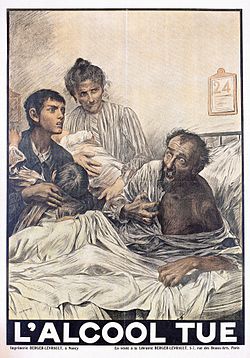Delirium tremens

Editor-In-Chief: Prab R Tumpati, MD
Obesity, Sleep & Internal medicine
Founder, WikiMD Wellnesspedia &
W8MD's medical weight loss NYC, sleep center NYC
Philadelphia medical weight loss and Philadelphia sleep clinics
| Delirium tremens | |
|---|---|

| |
| Synonyms | N/A |
| Pronounce | N/A |
| Specialty | N/A |
| Symptoms | Tremors, confusion, hallucinations, seizures, agitation |
| Complications | Cardiac arrhythmia, seizures, death |
| Onset | 2–3 days after alcohol withdrawal |
| Duration | 2–3 days |
| Types | |
| Causes | Alcohol withdrawal |
| Risks | Chronic alcohol use, history of delirium tremens, severe alcohol withdrawal |
| Diagnosis | Clinical diagnosis |
| Differential diagnosis | Sepsis, meningitis, encephalitis, Wernicke's encephalopathy, psychosis |
| Prevention | Benzodiazepines, thiamine |
| Treatment | Benzodiazepines, antipsychotics, supportive care |
| Medication | Diazepam, lorazepam, haloperidol |
| Prognosis | Good with treatment, but can be fatal if untreated |
| Frequency | 1–4% of patients with alcohol withdrawal |
| Deaths | N/A |


Delirium Tremens is a severe form of alcohol withdrawal that involves sudden and severe mental or nervous system changes.
Symptoms[edit]
Delirium tremens can occur when you stop drinking alcohol after a period of heavy drinking, especially if you do not eat enough food. Delirium tremens may also be caused by head injury, infection, or illness in people with a history of heavy alcohol use. Symptoms most often occur within 48 to 96 hours after the last drink. But, they can occur 7 to 10 days after the last drink. Symptoms may get worse quickly, and can include:
- Body tremors
- Changes in mental function
- Agitation, irritability
- Deep sleep that lasts for a day or longer
- Delirium
- Excitement
- Fear
- Hallucinations
- Increased activity
- Quick mood changes
- Restlessness, excitement
- Sensitivity to light, sound, touch
- Stupor, sleepiness, fatigue
Treatment[edit]
Hospitalization is needed to treat delirium tremens due to the chance of severe and life-threatening side effects such as cardiac arrhythmias, seizures, severe dehydration, and hallucinations. The goal of treatment is to control symptoms, prevent complications and therapy to help you stop drinking alcohol.
Prognosis[edit]
Delirium tremens is a medical emergency. It requires immediate treatment, which can significantly improve the outcome. Death can occur without treatment, and even with treatment may still occur.
Prevention[edit]
The best way to prevent delirium tremens is to limit alcohol intake. It is also important to consume a balanced diet with adequate dietary intake of thiamine.
See also[edit]
Ad. Transform your life with W8MD's Budget GLP-1 injections from $75


W8MD offers a medical weight loss program to lose weight in Philadelphia. Our physician-supervised medical weight loss provides:
- Weight loss injections in NYC (generic and brand names):
- Zepbound / Mounjaro, Wegovy / Ozempic, Saxenda
- Most insurances accepted or discounted self-pay rates. We will obtain insurance prior authorizations if needed.
- Generic GLP1 weight loss injections from $75 for the starting dose.
- Also offer prescription weight loss medications including Phentermine, Qsymia, Diethylpropion, Contrave etc.
NYC weight loss doctor appointmentsNYC weight loss doctor appointments
Start your NYC weight loss journey today at our NYC medical weight loss and Philadelphia medical weight loss clinics.
- Call 718-946-5500 to lose weight in NYC or for medical weight loss in Philadelphia 215-676-2334.
- Tags:NYC medical weight loss, Philadelphia lose weight Zepbound NYC, Budget GLP1 weight loss injections, Wegovy Philadelphia, Wegovy NYC, Philadelphia medical weight loss, Brookly weight loss and Wegovy NYC
|
WikiMD's Wellness Encyclopedia |
| Let Food Be Thy Medicine Medicine Thy Food - Hippocrates |
Medical Disclaimer: WikiMD is not a substitute for professional medical advice. The information on WikiMD is provided as an information resource only, may be incorrect, outdated or misleading, and is not to be used or relied on for any diagnostic or treatment purposes. Please consult your health care provider before making any healthcare decisions or for guidance about a specific medical condition. WikiMD expressly disclaims responsibility, and shall have no liability, for any damages, loss, injury, or liability whatsoever suffered as a result of your reliance on the information contained in this site. By visiting this site you agree to the foregoing terms and conditions, which may from time to time be changed or supplemented by WikiMD. If you do not agree to the foregoing terms and conditions, you should not enter or use this site. See full disclaimer.
Credits:Most images are courtesy of Wikimedia commons, and templates, categories Wikipedia, licensed under CC BY SA or similar.
Translate this page: - East Asian
中文,
日本,
한국어,
South Asian
हिन्दी,
தமிழ்,
తెలుగు,
Urdu,
ಕನ್ನಡ,
Southeast Asian
Indonesian,
Vietnamese,
Thai,
မြန်မာဘာသာ,
বাংলা
European
español,
Deutsch,
français,
Greek,
português do Brasil,
polski,
română,
русский,
Nederlands,
norsk,
svenska,
suomi,
Italian
Middle Eastern & African
عربى,
Turkish,
Persian,
Hebrew,
Afrikaans,
isiZulu,
Kiswahili,
Other
Bulgarian,
Hungarian,
Czech,
Swedish,
മലയാളം,
मराठी,
ਪੰਜਾਬੀ,
ગુજરાતી,
Portuguese,
Ukrainian
